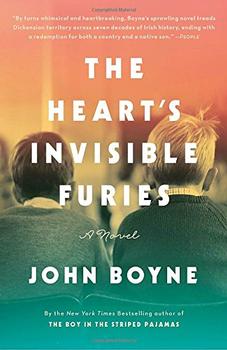Summary | Excerpt | Reviews | Beyond the Book | Read-Alikes | Genres & Themes | Author Bio

A Novel
by John BoyneThis article relates to The Heart's Invisible Furies
 In The Heart's Invisible Furies, author John Boyne traces the evolving acceptance of homosexuality in Ireland through the life of his main character, Cyril Avery.
In The Heart's Invisible Furies, author John Boyne traces the evolving acceptance of homosexuality in Ireland through the life of his main character, Cyril Avery.
Historically speaking, The Republic of Ireland has a conservative reputation, but homosexuality was actually accepted and accounted for in the set of medieval laws known as the Brehon Law. It's speculated that the early inhabitants of the country practiced a warrior culture and were therefore more tolerant of physical relationships between men, as was common in other warrior cultures (e.g., the Greeks – think Achilles and Patroclus). Brehon Law specifically stated that male partnerships should be tolerated as long as neither was married, and some historians believe that the early Christian church in Ireland included same-sex marriage rites.
As the Roman Catholic Church gained ascendency in Ireland homosexuality became a sin, although it wasn't criminalized until the 16th century. John Atherton (1598-1640), an Anglican bishop in the Church of Ireland, helped write a law that made "unnatural acts between men" punishable by death. (Interestingly, he was ultimately accused of this crime himself and hanged – along with his steward – under his own law.) Ireland's 1861 Offences Against the Persons Act lessened the penalty. It states: "Whosoever shall be convicted of the abominable crime of buggery, committed either with mankind or with any animal, shall be liable...to be kept in penal servitude for life."
During most of the 20th century gay men continued to be ostracized; if it became known that a man was a homosexual he could be denied jobs, physically abused, and/or arrested. (It seems that this standard didn't hold true for lesbians; sex between women has never been a crime in Ireland.) It wasn't until the Campaign for Homosexual Law Reform in the 1970s - a movement spearheaded by David Norris, at the time a lecturer at Trinity College Dublin – that people began discussing the decriminalization of same-sex relationships in Ireland.
A turning point came in 1983 with the murder of Declan Flynn. Flynn, a 31-year-old gay man, was killed in Fairview Park in Dublin, an area frequently used as a meeting place for homosexual men at the time. The five men who beat him to death confessed to a manslaughter charge but were given suspended sentences and released, sparking outrage not only among the gay community but across all Ireland. The first gay pride festival in the country was held in response, with the major thrust of the event being a demand for fair treatment of homosexuals.
In 1988, David Norris – now a senator - initiated legal proceedings to decriminalize homosexuality in Ireland. He lost the case in both the High Court and the Supreme Court, but was successful at the European Court level, putting pressure on Ireland to comply and remove anti-gay statues from their law books. It wasn't until the June 1993 passage of the Criminal Fraud (Sexual Offences) bill, however, that it was no longer a crime to be gay in Ireland.
Norris and others continued to champion for equal rights over the ensuing decades. In 2010 the Civil Partnership Act was passed, giving same-sex couples more legal rights, and in 2015 Ireland became the first country to legalize same-sex marriage on a national level by popular vote. It's now considered one of the most gay-friendly nations and is led by the openly gay Leo Eric Varadkar who was appointed Taoiseach (Prime Minister) in June 2017. Speaking in 2015, Varadkar said "it's not something that defines me. I'm not a half-Indian politician, or a doctor politician or a gay politician for that matter. It's just part of who I am, it doesn't define me, it is part of my character I suppose"
The situation is notably different in Northern Ireland (the small part of the island that is still part of the United Kingdom) which is the only region of the British Isles to prohibit same-sex marriage.
by Kim Kovacs
Filed under Society and Politics
![]() This "beyond the book article" relates to The Heart's Invisible Furies. It originally ran in August 2017 and has been updated for the
March 2018 paperback edition.
Go to magazine.
This "beyond the book article" relates to The Heart's Invisible Furies. It originally ran in August 2017 and has been updated for the
March 2018 paperback edition.
Go to magazine.
Your guide toexceptional books
BookBrowse seeks out and recommends the best in contemporary fiction and nonfiction—books that not only engage and entertain but also deepen our understanding of ourselves and the world around us.